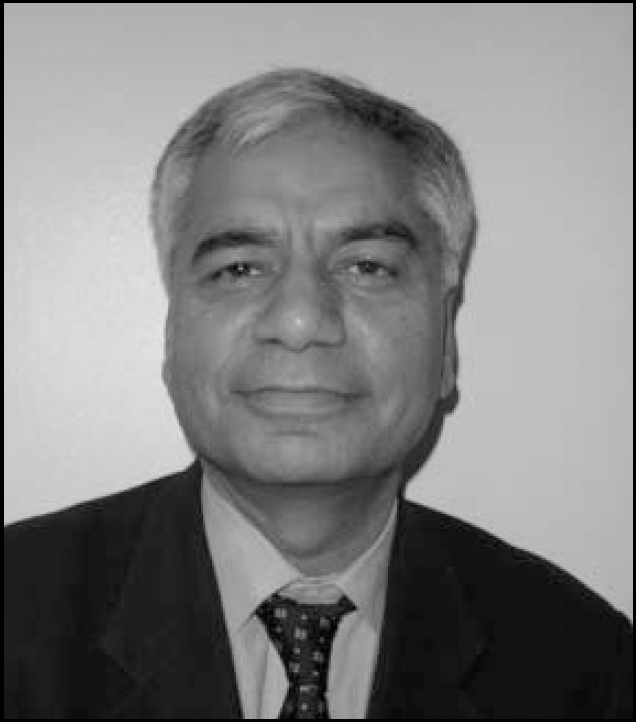Dinesh Bhugra is Dean of the Royal College of Psychiatrists and Professor of Mental Health and Cultural Diversity at the Institute of Psychiatry. He trained at the Armed Forces Medical College in Pune, India; Leicester and the Maudsley Hospital. Special interests include research in cultural psychiatry and psychosexual medicine.
If you were not a psychiatrist, what would you do?
I would have been in basic research and a teacher. In the final year of school I won the National Talent Search Scholarship which would have been sufficient to see me through to a PhD, but my parents pushed me towards medicine.

What has been the greatest impact of your profession on you personally?
Tolerance and acceptance of a range of behaviours, attitudes and experiences.
What are your interests outside of work?
Theatre, cinema and reading; especially crime novels — Patricia Highsmith is a great favourite; Hitchcock, Billy Wilder and Cukor films; Hindi films and Hindi film music.
Who was your most influential trainer, and why?
A lot of clinicians and academics have influenced me in different ways but perhaps the most significant was Professor Bob Cowley. His humanity, clinical acumen, intellectual grasp and ability to motivate people were extraordinary.
Which book/text has influenced you most?
Kleinman, A. Patients and Healers in the Context of Culture (California: University of California Press, 1980).
What research publication has had the greatest influence on your work?
Brown and Harris’ book on depression. For me it is the ideal research method to understand the impact of social and cultural factors on individuals and their functioning.
What part of your work gives you the most satisfaction?
Seeing patients and knowing that you are making a difference even if it sometimes takes years. It always amazes me that patients remember for a long time what the clinician had said to them in a session or at the time of a crisis. Teaching and talking with medical students and trainees.
What is the most promising opportunity facing the profession?
Modernising medical careers and the European Working Time Directive are two significant opportunities to change the way we recruit, train and retain our workforce and the way we deliver services.
What is the greatest threat?
Still the continuing stigma as evinced by stigmatising statements by politicians and other purse-string holders.
What single change would substantially improve quality of care?
Using truly integrated biological, psychological, socio-cultural and spiritual approaches.
What conflict of interest do you encounter most often?
Between personal and professional time constraints. Invariably work commitments creep into personal time.
Do you think psychiatry is brainless or mindless?
Neither and yet both. There are times when the focus is so much on the brain that human beings get forgotten and there are times that philosophy, in the broadest sense, takes over and ignores biological factors.
How would you entice more medical students into the profession?
By showing them that psychiatry is fun, involves patients as individual people and their carers, and has the ability to go beyond straightforward medicine. By using arts and literature to show the students how they can learn from a number of sources outside medical and psychiatric texts. By demonstrating to them that psychiatry is an integral part of medicine and all physical illness may have psychological sequelae.
What is the most important advice you could offer to a new trainee?
Be open-minded. The best thing about psychiatry is that just when you think you have seen it all a patient comes along to challenge your way of thinking and looking at things.
What are the main ethical problems that psychiatrists will face in the future?
Treating people against their will and issues of confidentiality.
How would you improve clinical psychiatric training?
At the present time it looks like a punishment that everyone has to do 5 years in training whether they need to or not. Some will need longer and others shorter so we need to be as flexible as possible. By reducing the emphasis on duration, focusing more on competencies, modular assessments, and more focus on teaching and assessing interpersonal skills. By making it possible for training and CPD [continuing professional development] to be available online and in due course to have online assessments.
What single change to mental health legislation would you like to see?
Linking it with the capacity to consent.
How should the role of the Royal College of Psychiatrists change?
It has to be facilitatory and forward-looking rather than entirely regulatory and reactive. For such a young College it is in serious danger of becoming fossilised.
What is the future for psychotherapy in psychiatry training and practice?
We need to get away from following just one model and use cognitive, behavioural and a mixture of other approaches. I would like to see trainees getting training in psychotherapy from day one.
What single area of psychiatric research should be given priority?
The interaction between anthropology, psychiatry and biological and social factors.
What single area of psychiatric practice is most in need of development?
The role and influence of culture on psychopathology and coping.



eLetters
No eLetters have been published for this article.